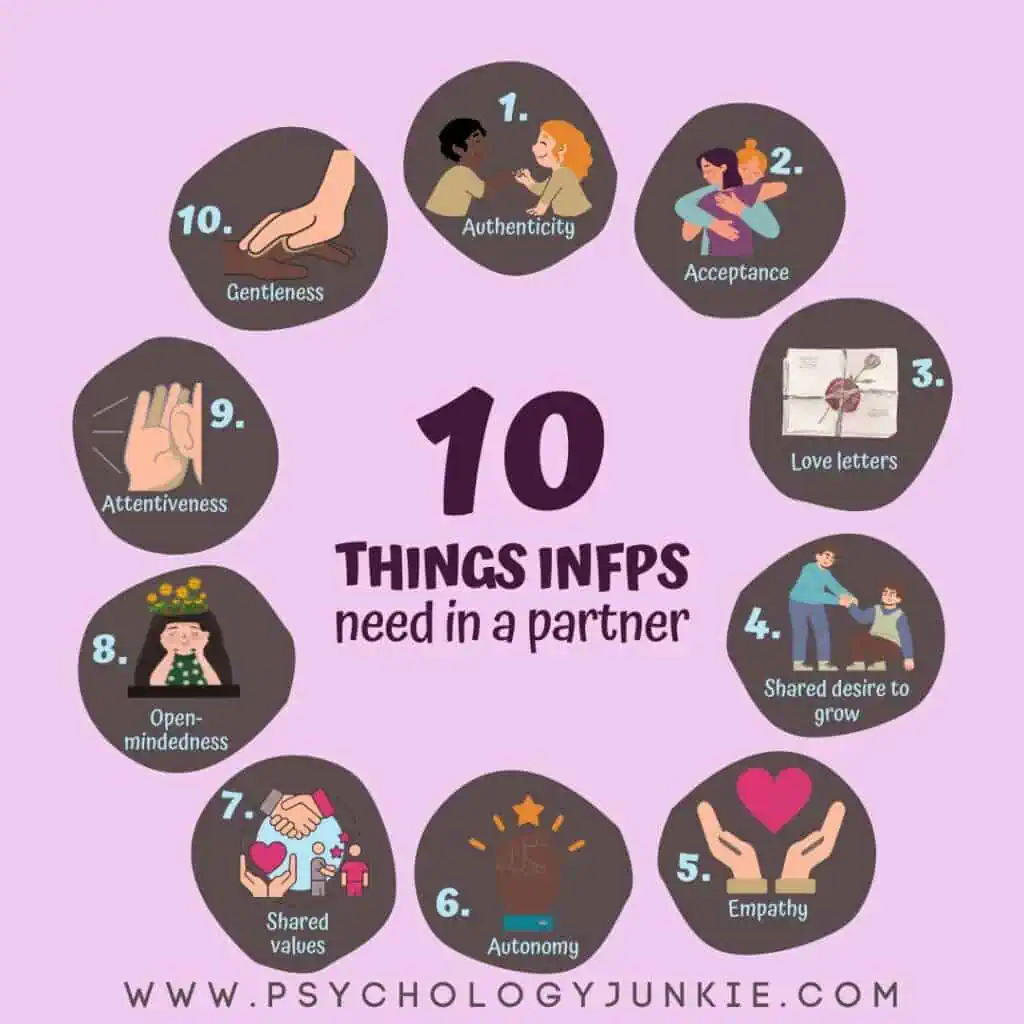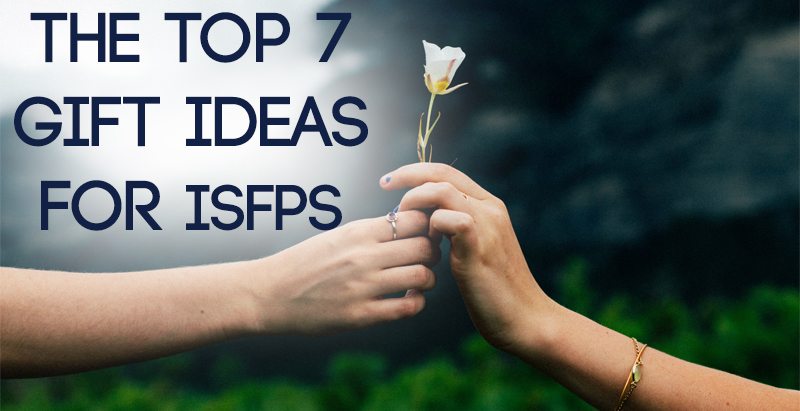10 Things INFPs Need in a Relationship
Being in a relationship with an INFP is like stepping into a world of dreams, emotions, and deep values. The world becomes bigger, your feelings become deeper, and you unlock a part of yourself you never knew existed. These gentle and imaginative souls crave connections that go beyond the surface. They’re not just looking for someone to pass the time with—they’re looking for someone who gets them, truly and deeply. So, what exactly do INFPs need in a relationship? Let’s dive in.
Not sure what your personality type is? Take our personality questionnaire here. Or you can take the official MBTI® here.

10 Things INFPs Need in a Relationship
1. Authenticity
INFPs value authenticity above almost everything else. They can sense when someone is putting on a façade, and nothing will push them away faster than dishonesty or pretense. If you’re in a relationship with an INFP, be your true self. They’re not looking for perfection—they’re looking for someone who’s real, who owns their flaws, and who isn’t afraid to be vulnerable. Pretending to be something you’re not won’t fly with an INFP. They need to know they’re with someone who’s genuine.
2. Open-Mindedness
These idealistic dreamers have a world of ideas inside them, and they need a partner who’s willing to explore those ideas with them. Whether it’s discussing future possibilities or simply musing about the psychological makeup of a fictional character, INFPs love sharing their thoughts with someone who’s open to new perspectives. They need a partner who listens without judgment and who’s willing to consider viewpoints different from their own.
“They who dream by day are cognizant of many things which escape those who dream only by night.” – Edgar Allan Poe
3. Gentleness
INFPs are incredibly sensitive people, and they need a partner who treats them with kindness and care. Harsh words, criticism, or rough treatment can be deeply hurtful to an INFP. They need someone who understands their emotional depth and who can respond with compassion and understanding, especially during difficult conversations.
In my latest survey on type and criticism, INFPs were the type who struggled the most with criticism. One INFP stated, “I always think at first ‘they hate me.’ Even if it’s irrational, even if they’re being really nice about it, or we’ve known each other forever. I just feel like crawling into a hole and not coming out again. But I get really upset.”
So how do you approach criticism well? When you give criticism to an INFP, be sure to give them time to reflect on what you’ve said. Don’t approach them in a confrontational or brusque way. Acknowledge their intent, efforts, and the positives you can see in what they’ve done first. When you get to the criticism part, use an “I feel” statement rather than an accusatory tone. For example, “I feel like I’m taking on a lot more of the household chores lately and it seems a little one-sided. I could use some help.” Instead of, “You’re not doing enough around here.” They might immediately back off or seem hurt. They may even need to be alone and post-process what you’ve said and their feelings around it. But they do want to be the best versions of themselves, so if the criticism is earned and fair, they will likely adjust as best as they can.
4. Support for Their Dreams
INFPs are driven by their ideals and their vision for a better world. They need a partner who believes in their dreams and who will support them, even if those dreams seem a little far-fetched. I like to think of INFPs as the creators of worlds. Some of our most revolutionary authors like Edgar Allan Poe, George Orwell, William Shakespeare, and George R.R. Martin were (or are) INFPs! Encouraging their creativity and exploring ideas together can inspire the INFP to really go out there and change the world with their creativity, ideals, and hard work. They’re not looking for someone to shoot down their ideas—they want someone to dream with them.
“In my imagination, I can come up with anything that I want. I can make things very large and very colorful.” – George R.R. Martin, a rumored INFP
5. Respect for Their Values
For an INFP, values are everything. They live their lives according to a strong internal moral compass, and they need a partner who respects that. Don’t mock or belittle their values, and don’t try to pressure them into compromising their principles. INFPs need to feel that their values are understood and appreciated in a relationship.
“To thine own self be true.” – William Shakespeare, a rumored INFP
6. Patience with Their Decision-Making
INFPs like to take their time when making decisions, especially when those decisions involve something important, like a relationship. They don’t want to be rushed into commitments or pushed into making choices before they’re ready. Give them the space and time they need to think things through. If you can be patient with their process, they’ll appreciate it more than you know.
7. Emotional Intimacy
While INFPs may be slow to open up, once they do, they crave deep emotional intimacy. They want to share their innermost thoughts and feelings with someone they trust. But they also need to know that they won’t be judged or dismissed when they do. When an INFP shares something personal with you, listen with empathy and understanding. Let them know you value their openness and that you’re there for them, no matter what. And be sure to actively listen; put your phone away and really be present with them when they’re sharing their heart with you.
8. Space and Privacy
As introverts, INFPs need time alone to recharge and process their thoughts. This doesn’t mean they don’t love spending time with their partner, but they also need space to reflect and unwind. Respect their need for privacy and don’t take it personally if they need some time to themselves. It’s just part of how they keep themselves emotionally balanced.
9. Written Expressions of Love
INFPs are deeply moved by written expressions of love. Whether this means sending them an old-fashioned love letter or writing an affirming message on a sticky note, these little written validations make a huge impact. When I’ve spoken to INFPs and surveyed them, this has come up again and again. Not much of a writer? Put together a custom playlist of songs that remind you of them! That is also something that they’ll deeply treasure.
10. Encouragement for Personal Growth
INFPs are always striving to become better versions of themselves, and they need a partner who supports that journey. Whether it’s through encouraging their creative pursuits, exploring new ideas together, or simply being there for them during times of self-reflection, they appreciate someone who values growth as much as they do. They want to be with someone who helps them become their best self, and who’s also committed to growing alongside them.
Summing Up What Does and Doesn’t Work in an INFP Relationship:
- Be sincere and genuine.
- Be open-minded and willing to explore new worldviews and perspectives.
- Listen attentively. Put your phone away!
- Avoid gossip or badmouthing others.
- Take an interest in personal growth and support them in theirs.
- Discuss your values and show respect for what matters to them.
- Respect their privacy and need for alone time.
- Approach criticism with gentleness and sensitivity.
Struggles INFPs May Face in Relationships
While INFPs bring a lot of heart and creativity to their relationships, they do face some challenges. Two of the most common are their idealism and sensitivity.
Idealism: INFPs often see the world as it could be rather than as it is. This can lead to frustration when reality doesn’t match up with their ideals. In relationships, they might have high expectations for their partner and for themselves, which can sometimes lead to disappointment. It’s important for them to find a balance between their ideals and the realities of everyday life.
Sensitivity: While sensitivity is one of the INFP’s greatest strengths, it can also be a challenge. They can be easily hurt by criticism or harsh words, and they may struggle to let go of negative emotions. A partner who understands their sensitivity and approaches them with gentleness and empathy will go a long way in helping them feel secure and loved.
What Do You Think?
If you’re an INFP, what would you say are the most important things you need in a relationship? What advice would you give to fellow INFPs or others who are interested in a relationship with them? Let us and other readers know by leaving a comment and sharing your thoughts!
Discover even more about your personality type in our eBooks, Discovering You: Unlocking the Power of Personality Type and The INFP – Understanding the Dreamer. You can also connect with me via Facebook, Instagram, or Twitter!
Other Articles You Might Enjoy:
September Bucket List Ideas for INFPs
















Relationship needs:
Acceptance for personality and outlook
Encouragement with challenges
Patience, openness, honesty, emotional connection…with harmony and love if possible.
Acceptance matters most. I spent over 30 years choosing my values, ideals and goals.
My emotions are so powerful that when they shift, my every perception significantly changes. I am autistic and bipolar. People and money are challenging. Encouragement and help mean a lot